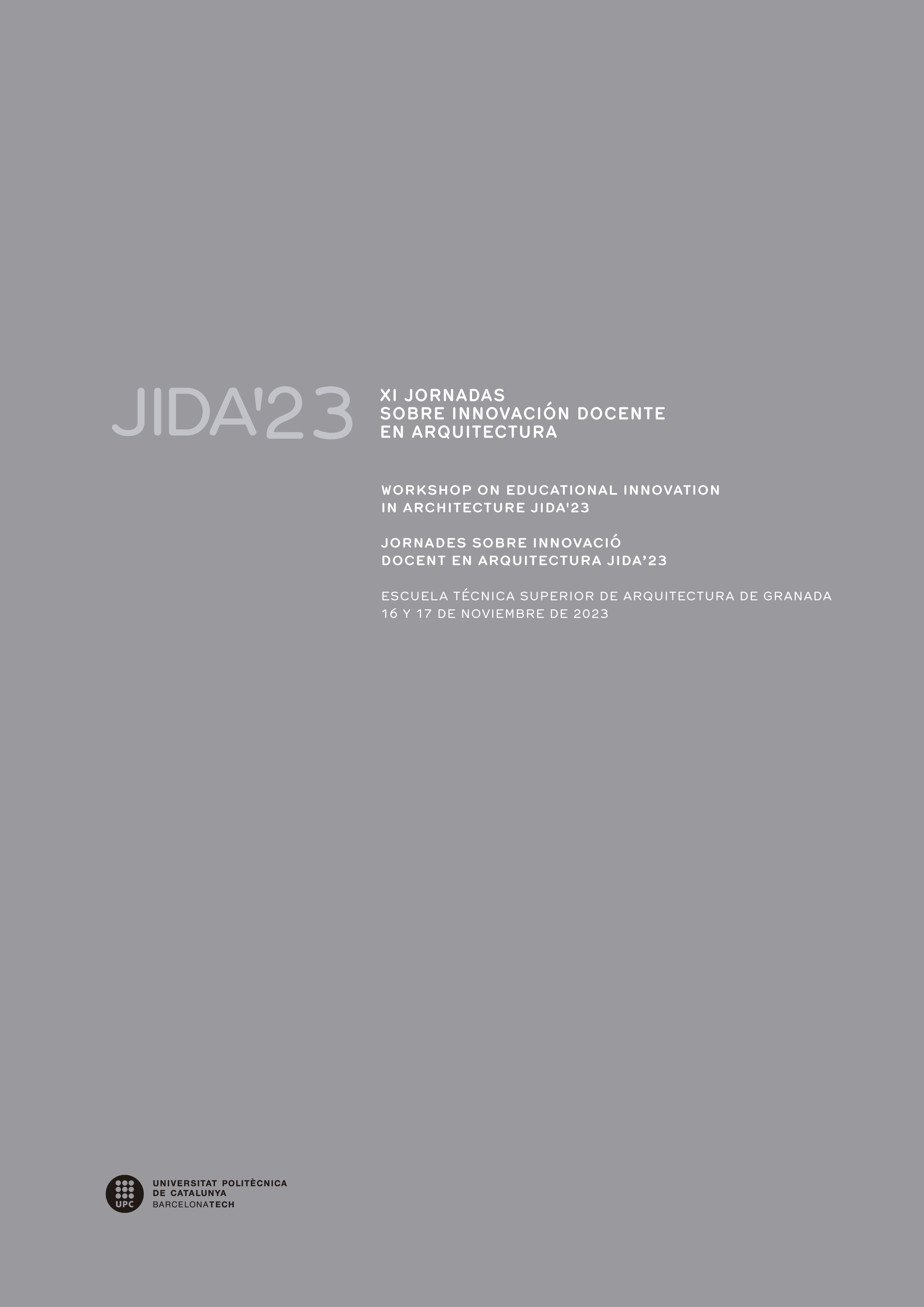Beyond the Steady State: Discursive Design as Reflective Practice Assisted by AI
disseny discursiu com a pràctica reflexiva assistida per IA
DOI:
https://doi.org/10.5821/jida.2023.12146Keywords:
artificial intelligence (AI), architectural design, techno-pedagogies, discursive design, online educationAbstract
This article examines how artificial intelligence (AI) can enrich the teaching of architectural design in an online education context. Through a course-workshop for teachers, AI is introduced in techno-pedagogies and discursive design. The pedagogical approach is based on active and reflective learning. Teachers apply AI in various phases of design, addressing ethical and social issues. The results show that AI offers valuable tools for teaching, although it also raises ethical concerns. The study concludes that AI has the potential to foster creativity and critical thinking in the teaching of architecture.
References
Argyris, C., & Schön, D. A. (1978). "Organizational Learning: A Theory of Action Perspective." Reading, MA: Addison-Wesley.
Bardzell, J., & Bardzell, S. (2013). "What is 'Critical' about Critical Design?" Proceedings of the SIGCHI Conference on Human Factors in Computing Systems, pp. 3297-3306.
Bates, T. (2019). "Teaching in a Digital Age: Guidelines for Designing Teaching and Learning." Vancouver, BC: Tony Bates Associates Ltd.
Brown, A. (2020). "Higher Education in the Era of the Fourth Industrial Revolution." Palgrave Macmillan.
Brown, J. (2020). "Transforming Higher Education: The Role of AI." Journal of Educational Technology, 12(3), 45-60.
Brynjolfsson, E., & McAfee, A. (2014). "The Second Machine Age: Work, Progress, and Prosperity in a Time of Brilliant Technologies." New York: W. W. Norton & Company.
Castells, M. (2011). "The Rise of the Network Society." Oxford: Blackwell Publishers.
Clark, R. (2019). "Tecno-pedagogies: The Intersection of Technology and Pedagogy." Journal of Online Learning, 7(2), 22-35.
Clark, R. E. (2019). "Learning from Media: Arguments, Analysis, and Evidence." Charlotte, NC: Information Age Publishing.
Creswell, J. W. (2014). "Research Design: Qualitative, Quantitative, and Mixed Methods Approaches." Thousand Oaks, CA: Sage Publications.
Davis, M. (2021). "Flexible Learning Models in Higher Education." Journal of Educational Innovation, 15(1), 18-32.
Dunne, A., & Raby, F. (2013). "Speculative Everything: Design, Fiction, and Social Dreaming." Cambridge, MA: MIT Press.
Eco, U. (1976). A Theory of Semiotics. Bloomington: Indiana University Press.
Foucault, M. (1980). "Power/Knowledge: Selected Interviews and Other Writings, 1972-1977." New York: Pantheon Books.
Freire, P. (1970). "Pedagogy of the Oppressed." New York: Continuum.
Fullan, M. (2016). "The New Meaning of Educational Change." New York: Teachers College Press.
Illeris, K. (2009). "Contemporary Theories of Learning." London: Routledge.
Johnson, B. (2018). "Ethics in the Age of Artificial Intelligence." Cambridge, MA: MIT Press.
Johnson, L. (2017). "NMC Horizon Report: 2017 Higher Education Edition." Austin, TX: The New Media Consortium.
Johnson, L. (2017). "The New Landscape of Mobile Learning: Redesigning Education in an App-Based World." New York: Routledge.
Knowles, M. S. (1975). "Self-Directed Learning." Chicago: Follett Publishing Company.
Kolb, D. A. (2014). "Experiential Learning: Experience as the Source of Learning and Development." Englewood Cliffs, NJ: Prentice Hall.
Kumar, M. (2019). "AI-enhanced Design: A Provocation Piece." She Ji: The Journal of Design, Economics, and Innovation, 5(4), 290-299.
Luckin, R. (2018). "Machine Learning and Human Intelligence: The Future of Education for the 21st Century." London: UCL Institute of Education Press.
Manovich, L. (2001). "The Language of New Media." Cambridge, MA: MIT Press.
Manzini, E. (2015). "Design, When Everybody Designs: An Introduction to Design for Social Innovation." Cambridge, MA: MIT Press.
Mezirow, J. (1997). "Transformative Learning: Theory to Practice." New Directions for Adult and Continuing Education, 1997(74), 5-12.
Moore, M. G. (2019). "Handbook of Distance Education." New York: Routledge.
Negroponte, N. (1995). "Being Digital." New York: Knopf.
Norman, D. A. (2013). "The Design of Everyday Things: Revised and Expanded Edition." New York: Basic Books.
Papanek, V. (1971). "Design for the Real World: Human Ecology and Social Change." New York: Pantheon Books.
Russell, S., & Norvig, P. (2021). "Artificial Intelligence: A Modern Approach." Upper Saddle River, NJ: Prentice Hall.
Schön, D. (1971). "Beyond the Stable State." New York: W. W. Norton & Company.
Schön, D. A. (1983). "The Reflective Practitioner: How Professionals Think in Action." New York: Basic Books.
Schwab, K. (2016). "The Fourth Industrial Revolution." New York: Crown Business.
Schwartz, B. (2021). "The Paradox of Choice: Why More Is Less." New York: Harper Perennial.
Schwartz, D. L. (2021). "The ABCs of How We Learn: 26 Scientifically Proven Approaches, How They Work, and When to Use Them." New York: W. W. Norton & Company.
Selwyn, N. (2016). "Is Technology Good for Education?" Cambridge: Polity Press.
Selwyn, N. (2016). "Education and Technology: Key Issues and Debates." London: Bloomsbury Academic.
Senge, P. M. (1990). "The Fifth Discipline: The Art and Practice of the Learning Organization." New York: Doubleday.
Solé Gras, A., et al. (2021). "A propósito de la escala dinámica como método de aprendizaje transversal." JIDA 8: Textos de Arquitectura Docencia e Innovación, pp. 173-186. ISBN 9788498809336.
Taleb, N. N. (2012). "Antifragile: Things That Gain from Disorder." New York: Random House.
Tharp, B. M., & Tharp, S. M. (2019). "Discursive Design: Critical, Speculative, and Alternative Things." Cambridge, MA: The MIT Press.
Tonkinwise, C. (2015). "How We Weave Now." Interaction Design and Architecture(s) Journal, 24, 87-96.
Wang, F. (2020). "Educational Technology: Leadership Perspectives." Charlotte, NC: Information Age Publishing.
Wang, Y. (2020). "The Role of Artificial Intelligence in Transforming Higher Education." Journal of Educational Technology, 12(4), 70-85.
Wheeler, S. (2015). "Learning with 'e's: Educational Theory and Practice in the Digital Age." Carmarthen: Crown House Publishing Limited.
Williams, A. (2019). "Posthumanism: A Guide for the Perplexed." London: Bloomsbury Academic.
Williams, R. (2019). "The Politics of Design: A (Not So) Global Manual for Visual Communication." Amsterdam: BIS Publishers.
Williams, S. (2019). "Tecno-pedagogies and Online Learning." Journal of Online Education, 6(1), 5-20.
Wingfield, B. (2020). "AI in Architectural Education: A Critical Overview." Journal of Architectural Education, 74(1), 89-100.
Zimmerman, A. (2020). "The Coronavirus Pandemic and Lessons for Preparedness." Journal of Public Health Policy, 41, 238-242.






















